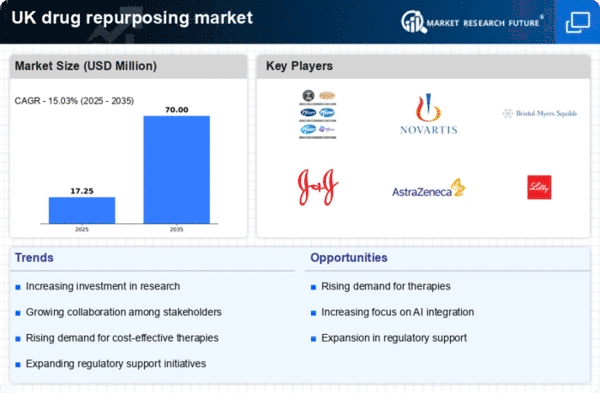Rising Healthcare Costs
The escalating costs associated with healthcare in the UK are driving interest in the drug repurposing market. As the National Health Service (NHS) faces budget constraints, there is a pressing need for cost-effective treatment options. Drug repurposing offers a viable solution, as it can significantly reduce the time and financial investment required for drug development. By utilizing existing drugs for new therapeutic indications, the drug repurposing market can potentially lower the average cost of bringing a new treatment to market, which can exceed £1 billion. This financial incentive is likely to encourage pharmaceutical companies and healthcare providers to explore repurposed drugs as a means to alleviate the burden of rising healthcare expenses.
Advancements in Data Analytics
The emergence of advanced data analytics tools is transforming the drug repurposing market in the UK. These tools enable researchers to analyze vast datasets, identifying potential new uses for existing drugs more efficiently. By leveraging machine learning and artificial intelligence, researchers can uncover novel therapeutic applications that may have previously gone unnoticed. This technological advancement is likely to enhance the drug repurposing process, making it more efficient and cost-effective. As a result, the drug repurposing market may experience accelerated growth, as companies harness these innovations to bring repurposed drugs to market more rapidly.
Supportive Regulatory Environment
The regulatory landscape in the UK is becoming increasingly supportive of drug repurposing initiatives. Regulatory bodies, such as the Medicines and Healthcare products Regulatory Agency (MHRA), are recognizing the value of repurposed drugs in addressing public health challenges. This supportive environment is likely to facilitate faster approval processes and streamlined pathways for repurposed drugs, thereby enhancing their market viability. The drug repurposing market benefits from this trend, as it can lead to quicker access to innovative therapies for patients. The potential for reduced regulatory hurdles may encourage more companies to invest in drug repurposing projects, further driving market expansion.
Collaboration Between Academia and Industry
There is a notable trend of collaboration between academic institutions and the pharmaceutical industry in the UK, particularly in the drug repurposing market. These partnerships are fostering innovation and facilitating the sharing of knowledge and resources. Academic researchers often possess valuable insights into drug mechanisms and potential new applications, while industry partners bring expertise in drug development and commercialization. This synergy is likely to enhance the drug repurposing process, leading to the identification of new therapeutic uses for existing drugs. As these collaborations continue to grow, the drug repurposing market may benefit from increased investment and a more robust pipeline of repurposed therapies.
Increased Patient Demand for Innovative Therapies
There is a growing demand among patients in the UK for innovative therapies that can address unmet medical needs. The drug repurposing market is well-positioned to meet this demand, as it allows for the rapid introduction of new treatment options based on existing medications. Patients are increasingly seeking alternatives to traditional therapies, particularly for chronic and complex conditions. This shift in patient expectations is likely to drive investment in the drug repurposing market, as healthcare providers and pharmaceutical companies aim to deliver effective solutions that resonate with patient needs. Improved patient outcomes through repurposed drugs may further stimulate market growth.
















